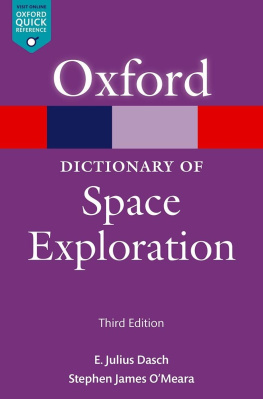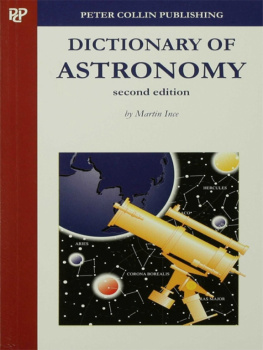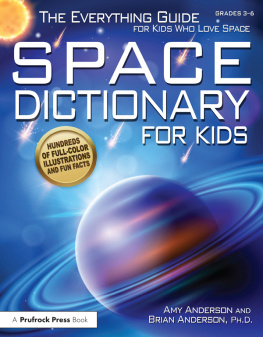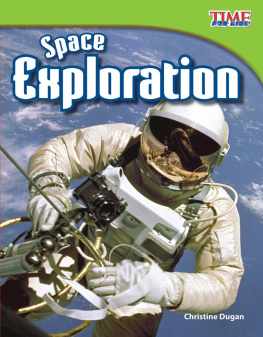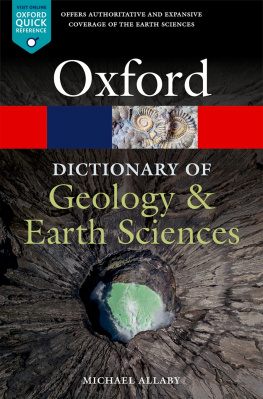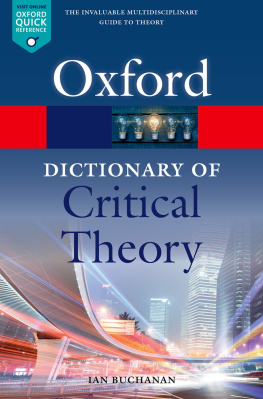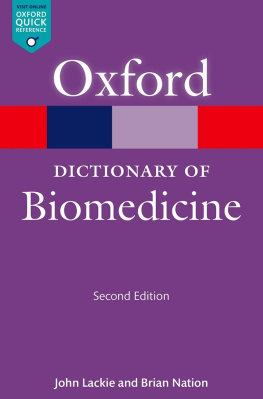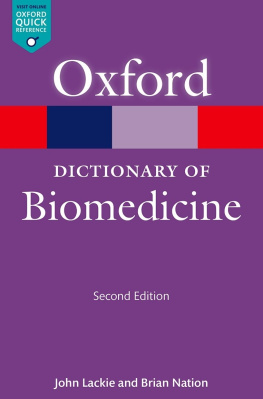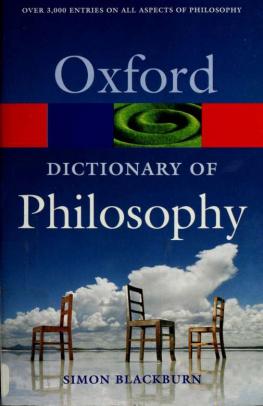While most e-readers can display special characters (such as and ), many cannot search for words containing them, unless the special characters themselves are typed into the search box. If you are unable to type these characters, please browse for your term using the .
A Dictionary of Space Exploration
Third Edition
Dr E. Julius Dasch and Stephen James OMeara

Great Clarendon Street, Oxford, ox 2 6 dp , United Kingdom
Oxford University Press is a department of the University of Oxford. It furthers the Universitys objective of excellence in research, scholarship, and education by publishing worldwide. Oxford is a registered trade mark of Oxford University Press in the UK and in certain other countries
Original material Research Machines plc 2005, Helicon Publishing is a division of Research Machines; new material Oxford University Press 2005, 2018
The moral rights of the authors have been asserted
First published as A Dictionary of Space Exploration by Oxford University Press in 2005; new edition published online only 2018
All rights reserved. No part of this publication may be reproduced, stored in a retrieval system, or transmitted, in any form or by any means, without the prior permission in writing of Oxford University Press, or as expressly permitted by law, by licence or under terms agreed with the appropriate reprographics rights organization. Enquiries concerning reproduction outside the scope of the above should be sent to the Rights Department, Oxford University Press, at the address above
You must not circulate this work in any other form and you must impose this same condition on any acquirer
Published in the United States of America by Oxford University Press 198 Madison Avenue, New York, NY 10016, United States of America
British Library Cataloguing in Publication Data
Data available
Library of Congress Cataloging in Publication Data
Data available
eISBN 9780191842764
ebook ISBN 9780192526595
Content
Aerospace Facilities, Centres, and Museums
Agencies, Organizations, Departments, and Teams
Astrodynamics and Aerodynamics
Instruments and Equipment
Missions/Programmes and Projects
Nomenclature, Jargon, Policies, and Symbols
People
Rockets and Rocketry: Launch, Tracking, and Data
Societies, Institutions, and Departments
Spacecraft: Components and Parts
Spacecraft: Satellites, Probes, and Other
Systems Technology
.
.
The heat shield on a spacecraft to protect it during re-entry. The intense heat generated by friction during the high-speed entry of the craft into the Earth's atmosphere burns away ablative (evaporating) materials on the heat shield, absorbing the heat and protecting the craft. The space shuttle used a different kind of non-ablative protection made up of thousands of heat-absorbing tiles.
.
). Only ATO has had to be used, on one mission in 1985 . There were also several unofficial contingency aborts that could save the crew in the event of an emergency during a launch, but there was no guarantee of saving the craft or the crew. An abort was impossible during a shuttle descent, such as when Columbia broke apart on 1 February 2003 , killing its crew of seven.
in 1959 to create near-perfect reliability for crewed space flights. ASIS could sense and signal an impending catastrophic failure and then activate the crew's escape plan prior to the failure. Before this addition, the Atlas rocket had only launched weapons.
A continuous and non-periodic change in orbital velocity of one body around another, or the axial rotation period of a body.
An example is the axial rotation of the Earth. This is gradually slowing down owing to the gravitational effects of the Moon and the resulting production of tides, which have a frictional effect on the Earth. However, the angular momentum of the EarthMoon system is maintained, because the momentum lost by the Earth is passed to the Moon. This results in an increase in the Moon's orbital period and a consequential moving away from the Earth. The overall effect is that the Earth's axial rotation period is increasing by about 15 millionths of a second per year, and the Moon is receding from the Earth at about 4 cm per year.
.
If the central object of the accretion disc has a strong gravitational field, as with a neutron star or a black hole, gas falling onto the accretion disc releases energy, which heats the gas to extreme temperatures and emits short-wavelength radiation, notably X-rays.
.
tracks a spacecraft. The ace analyses real-time data from the spacecraft, watches for problems, and initiates the appropriate responses.
.
) or locating spacecraft position by radar.
.
Active galaxies are thought to contain black holes with a mass 108 times that of the Sun, drawing stars and interstellar gas towards them in a process of .
to measure wind in the Earth's atmosphere.
.
missions: an 80-orbit flight aboard Columbia in August 1989 and a 142-orbit mission aboard Atlantis in August 1991 .
Adamson was selected as an astronaut in 1984 and remained at in 1995 and president of Allied Signal Technical Services Corporation in 1999 . He remained at Allied until his retirement in March 2001 .
.
.
.
, it was launched in September 1993 and conducted 103 experiments in 74 000 hours before ending its work in May 2000 . ACTS utilized spot-beam antennae and on-board switching and processing systems for the tests.
from where it provides advance warning (about one hour) of geomagnetic storms that can overload power grids, disrupt communications on Earth, and endanger astronauts.
, it gathered data on climate change, the environment, and land and ocean processes. On 30 June 1997 , ADEOS suffered damage to its solar array that made it go out of control and led to its subsequent failure.
There were eight instruments on board ADEOS, including the ocean colour and temperature scanner (; for precise observations of the land, oceans, and clouds); last contact with the satellite was made in October 2003 , when the satellites solar panels failed, ending the mission.
). ALOS has three sensors: a stereo mapping camera to measure land elevation, a visible and near-infrared radiometer to observe the covering of land surfaces, and a synthetic aperture radar that enables day-and-night and all-weather land observation. ALOS launched from the Tanegashima Space Centre in January 2006 ; it lost power in May 2011 and shut down.
, the research team investigates ways to produce food, purify water and air, and regenerate oxygen. Experiments involve growing crop plants for food and oxygen regeneration, and researching biological and physico-chemical processes to turn waste into usable resources.

